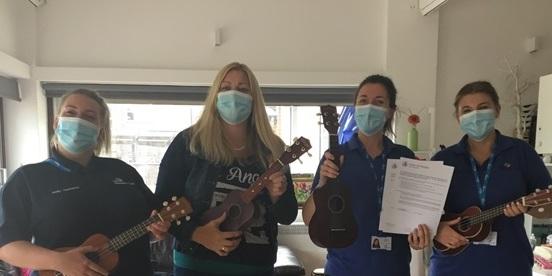
Published on: 05/08/21
Sophie, music therapist at The Children’s Trust School, explains how a skills sharing project for staff made a real difference to pupils.

Published on: 05/08/21
Pictured: Holly, Lucy and Ishbel being presented with their certificates with Sophie Dawson, Specialist Music Therapist at The Children’s Trust School
Music therapy is a fantastic way to help people of all ages express themselves and communicate through music.
Music therapy focuses on developing the therapeutic relationship between therapist and pupil, offering a safe and supportive environment where feelings can be shared.
As the relationship grows, the therapist identifies the pupil’s developmental and emotional needs and directs the therapy accordingly. We offer both individual and group music therapy sessions at The Children's Trust School.
Sessions include musical improvisation, instrument exploration, familiar song, song-writing, music technology, music listening, the list goes on!
Music therapy aims to offer a variety of experiences that will offer pupils the chance to interact and express themselves through music.
To add to our music therapy offering, I recently had the pleasure of facilitating a skill sharing project with staff. The project was run on one of our school residential houses over six weeks – three care support assistants and our school leisure and activities coordinator took part.
The staff led on what they wanted to gain from the training. The discussions we had in the first week shaped the next five sessions. Conversation flowed naturally and there was an air of excitement about what we were about to embark on. Staff were keen to learn how to use music interactively and the passion for the work they do and the young people they work with was evident.
The group looked at how we could use different activities and music technology with the school pupils; how to make karaoke accessible; and we created our own hello song with the use of the ukulele!
Staff learnt how to use music in a variety of ways without necessarily having had previous musical training, putting an emphasis on the quality of the interaction with the pupil. This could be done simply with voice, a shaker, or a drum! When exploring the use of voice we received some lovely reactions when improvising based on the names of the pupils.
Towards the end of the six weeks, the staff on the project led groups based on the activities we had explored. The groups we worked with were open groups and attendance depended on which children and young people were well enough/able to attend each week. This presented its own challenges as the carers needed to adapt and improvise based on the different personalities in the group.
It was fantastic to see the overwhelmingly positive reactions from the pupils. It was lovely, and important to note, the relationship the carers have with the pupils. This is what made the groups special.
Pupils were engaging with staff in a way they hadn’t done before and this was exciting for both staff and pupils to be a part of. The carers facilitated a real sense of community.
I feel fortunate to have worked with people who have such enthusiasm and care for their work. This really translated to their music making, with many members wanting to continue their ukulele practice outside of project hours. It was great to see how staff supported each other, with one member offering to support another in her first music group outside of the project.
The team worked so hard and were truly dedicated – the project really helped staff to think of different ways they could use music to engage with the school pupils.